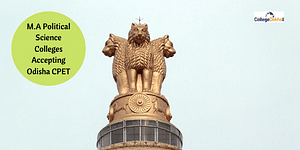MA Political Science Syllabus & Subjects 2025
MA Political Science Syllabus & Subjects
The MA Political Science course, also known as Master of Arts in Political Science, is a two-year postgraduate degree program in India. It examines political theory and practice, as well as the description and analysis of the political system along with political behavior. MA Political Science course syllabus includes both core and elective courses. However, the MA in Political Science syllabus may differ slightly depending on the university/college. Even so, each college or university's MA Political Science syllabus usually is divided into four semesters. In addition to a wide range of electives like Themes in Citizenship, The Modern State in Comparative Perspective, Critical Traditions in Political Theory, and so forth, MA Political Science subjects include Political Theory, Critical Analysis, Philosophy, and Ethics. A master's degree in political science opens up a wide range of career options in both the public and private sectors, which helps with finding a job.
MA Political Science syllabus covers a variety of topics, including:
- Political theory and thought
- Comparative politics
- International relations
- Political institutions
- Regional studies
- Political economy
- Public policy and administration
- Contemporary political issues
- Research methodology
MA Political Science syllabus consists of core courses that cover fundamental political science concepts. The MA Political Science syllabus includes elective subjects that focus on specific aspects of political science. In addition to the core subjects and electives listed in the MA Political Science syllabus, students must complete a project report or dissertation on a topic related to and relevant to current political scenarios. MA Political Science is a popular choice for students. They chose this course to learn about various political topics. This programme helps students develop political and social awareness. To provide students with knowledge, universities or colleges develop extensive MA Political Science course syllabuses.
The MA Political Science Syllabus seeks to teach students academic knowledge while also developing political values. Students get a solid understanding of a variety of topics, such as international organisations and international relations. The MA Political Science course subjects are chosen and incorporated into the syllabus based on expert advice and current learning needs. Furthermore, when developing the syllabus and incorporating MA Political Science subjects, learners' goals are always considered.
Table of Contents
- MA Political Science Syllabus & Subjects
- MA Political Science Year Wise Syllabus
- MA Political Science Semester-Wise Syllabus
- MA Political Science Subjects
- MA Political Science Optional Subjects
- MA Political Science Entrance Exam
- MA Political Science: Scheme of Assessment
- MA Political Science Important Books
- MA Political Science Course Structure
- FAQs about M.A. Political Science Syllabus
MA Political Science Year Wise Syllabus
Given below are some subjects that may be included in an MA Political Science syllabus:
MA Political Science First Year Syllabus
Comparative political analysis, politics in India, theories of international relations, themes in Indian political thought, debates in political theory, political context, and debates on freedom and justice.
MA Political Science Second Year Syllabus
Administrative theory, theories and approaches to the study of public administration, contextual public administration, contemporary developments, grassroots governance, alternative perspectives, and themes in world politics and international political economy.
MA Political Science Elective Subjects
Theory and practice of democracy, ancient Indian political thought, international law, public policy studies, constitutional development in India, theories of nationalism and processes of nation-building, and strategic studies in international relations.
MA Political Science Semester-Wise Syllabus
An overview of MA Political Science course syllabus is provided below. Universities have different structures for their syllabuses. Nonetheless, students can understand the course outline from the syllabus provided below:
MA Political Science 1st Year Syllabus
The following table outlines the semester-wise MA Political Science syllabus for 1st year:
| MA Political Science Semester I Syllabus |
|---|
| Indian Political Thought |
| Western Political Thought |
| Contemporary Political Philosophers |
| Modern Political Theory |
| MA Political Science Semester II Syllabus |
| Modern Political Analysis |
| Public Administration |
| Government and Politics |
MA Political Science 2nd Year Syllabus
The following table outlines the semester-wise MA Political Science syllabus for 2nd year:
| MA Political Science Semester III Syllabus |
|---|
| Research Methods in Politics |
| Indian Polity- Its structures and goals |
| Issues of Indian Politics |
| Indian Administration |
| Different state politics |
| MA Political Science Semester IV Syllabus |
| International Relations |
| Foreign Policy of India |
| International Law |
| International Political Economy |
| Projects |
MA Political Science Subjects
Listed below are the subjects taught in the MA in Political Science course:
| MA in Political Science Subjects | |
|---|---|
| Overview of Indian Political Thought | Political Development |
| Overview of Western Political Thought | Political Modernization |
| Philosophies of Different Political Philosophers | Political Culture |
| Comparative Politics | Political Socialisation |
| Democratic Political Theory | Modern Political Analysis |
| Post-Modernism in Political Theory | Theories of Organization |
| Multiculturalism | Development Administration |
| Communitarianism | Constitutionalism |
| Legislature | Judiciary |
| Contemporary Political Issues of India | Philosophy of Indian Constitution |
| Indian Parliament | Indian Democracy, its issues, challenges, and essence |
| New Institutional Mechanism of Governance | Indian Administration and its different aspects |
| State Politics and its different aspects | International Politics and its different aspects |
| International Relations | International Law |
Listed below are the detailed subjects and topics covered in the MA in Political Science course:
| Name of Course | Topics covered | Objective |
|---|---|---|
| Debates in Political Theory | Introduction to Political Theory, the Political context Debates on freedom Debates on Equality Debates on Justice Debates on Rights Debates on Democratic Political Community | A better grasp of the nature and significance of political theories is facilitated by this course. |
| Comparative Political Analysis | Comparative Methods and Approaches Nationalism and Anti-colonial struggle Development Theories of the State State Forms Comparative Party System Social Movements and Revolution | It contributes to the discussion of various political philosophies and the ways that de-centering has greatly influenced the field. |
| Politics in India | Approaches to Indian Politics State in India Class, Caste, Tribe and Gender Religion, Region and Language Development Process Political Parties Elections Social Movements: Objectives, methods, impact and the recent trend | This course focuses on the different facets of society and how Indian politics are influenced by them. |
| Theories of International Relations | Introduction to International Relations Structural Realism Indian Tradition: Kautilya’s Realpolitique Chinese Tradition European Schools of Thought The English School Neo-Liberalism Institutionalism Alternative Approaches in International Relations Problems of the ‘International’ | Students take this course to learn about the various traditions of international relations theory as it has developed globally. |
| Administrative Theory | Evolution of the discipline of Public Administration Contextual Public Administration Contemporary Development – New Public Administration, New Public management Grassroots governance: alternative perspectives | This course focuses on the theories and the associated structures and procedures that have shaped the contemporary system of governance. |
| Themes in Indian Political Thought | Perspectives Theories and practices of Knowledge State Conception and Forms of communities Critical Perspectives on Indian Society The Nation in Indian Political Thought | Students are introduced to Indian political thought tradition in this course. |
| Interpreting Modern India | Conceptions of the Modern Perspectives on Justice and Social Transformation Conceptions of Nationalism Development and its Critiques Community, Civil Society and Public Sphere Debates on Globalization | The purpose of this course is to familiarise students with the current situation in India and its potential future. |
| Democracy and Political Institutions in India | Theory and Practice of the Indian Constitution Functioning and inter-relationship of governmental institutions Federalism Local Self Government Rule of law, rights, and accountability | The objectives of this course is to examine the historical development of modern institutional forms and practices. |
| Political Philosophy | Introduction Plato : The Republic Aristotle : The Politics Machiavelli : The Prince Hobbes : Leviathan Locke : The Second Treatise of Government Rousseau : Social Contract Kant: Groundwork of the Metaphysic of Morals Hegel : Philosophy of Right Marx and Engels Nietzsche : On the Genealogy of Morals Mary Wollstonecraft : A Vindication of the Rights of Woman Mahatma Gandhi : Hind Swaraj | The purpose of this course is to expose students to classic western texts that have influenced the development and evolution of political thought. |
| Themes in World Politics and International Political Economy | Concepts of State, Power, Security, Culture and Religion International Political Economy Environmental Governance Global Challenges and Movements | In order to comprehend international politics and the basic theoretical problems in the field of international political economy, this course introduces a few key concepts. |
| Ethics and Politics | The Nature of Ethical Reasoning Sexual, Racist and Caste Discrimination Poverty and Hunger Environment Militarization Corruption Free Speech Secularism, Tolerance and Minority Rights The Morality of Representation Ethics and Politics of the Family Ethics and the Profession | The topic of this course looks at the connection between political theory and ethics, which is a crucial component of political philosophy. |
| Critical Traditions in Political Theory | Marxism Feminism Dalit Bahujan Critique Critical Race Theory Ecological Critique | The main objections to mainstream liberal theory are to be emphasised in this course. |
| Social Movements and Revolution | Revolution – French, Bolshevik, Chinese Ideology and politics of liberation in Asia and Africa Social Movements Ideology and Politics of Social Movement | It emphasises the conceptual, historical, and empirical distinctions between social movements and revolutions while focusing on the diverse facets of various movements. |
| Parties, Elections and Political Process in India | Typology of Political parties in India Party System in India The changing profile of National Political Parties Regional and State Parties Elections in India Non-Party Movements, NGOs and their impact on Political Parties and Representation of People’s Interests | In the context of India, this course discusses the party and electoral systems. |
| Development Process and Politics in India | Theory of the Developmental State Concept of Development Socio-Economic Problems and Issues of Development in India Development Strategy and State Policies in India Shift in Developmental Policies and Strategies Critiques of Development and Alternative Models Democracy, Decision Making and Development Non-Governmental Initiatives, and People’s Empowerment | The theory and practice of development issues in India are the focus of this course. |
| Democracy and Human Rights in India | The concept of Human Rights National and International Dimensions of Human Rights and Constitutional-Legal Framework in India Human rights: Issues and challenges Impact on deprived groups State response to Human rights Civil Society and Human Rights NHRC and Other Commission Reports Democracy, development and Human Rights in India | Political philosophy is fundamentally based on human rights, and this course emphasises the connections between the two fields. |
| Public Institutions and Governance | Theoretical Issues: State and Development: Historical and Comparative Experiences From Structural Adjustment to Good Governance Public Finance & Management Administrative and Civil Service Reform Practical Issues in India State Governments: Comparative Development Performance Public Enterprises in India Social Development: Issues, Policies & Challenge Infrastructure Development: Issues, Policies & Challenges | The many topics surrounding public enterprises and their role are the main focus of this course. It also looks at the outcomes of administrative and civil service reforms. |
| Rural-Urban Development and Local Government in India | Understanding the 'rural’ and 'urban' in India. What is Development? Institutional framework for Rural & Urban Development Planning Rural Development: Approaches, Policies, and Programmes: Planning Urban Development: Approaches, Policies and Programs Decentralization, and Local Governments Devolution and functioning of Panchayati Raj Institutions Devolution and functioning of Urban Local Bodies People's Participation in Rural-Urban Development: Role of NGO's and Citizen Groups | This course will look at local government structures in both rural and urban areas, both before and after the Panchayati Raj Institution was established. |
| Environment and Development: Policy and Politics | Environment and Development: An Introduction State, Market, Community & Local Governments Policy, Politics, Institutions, and Resources Poverty-Environment Inter-linkages Caste, Gender and Environment Global Commons and Initiatives Environmental and Social Movements | This course looks into a range of issues, regulations, and practices related to India's environment. |
| Public Policy | What is Public Policy? Public Policy: Concept and Dimension Approaches to Public Policy Studies Public Policy Process Public Policy Analysis: Quantitative and Qualitative Models Public Policy Research and Development Public Policy in India: Models and Trends Globalization. MNCs, WTO, and Development in India Impact of Public Policies on Socio-Economic Development and Nation Building in India | This course seeks to provide a theoretical, financial, and practical framework for understanding the nature and necessity of public policy. |
MA Political Science Optional Subjects
MA Political Science subjects taught as optional papers are generally introduced in second semesters. Some universities teach these papers in the third and fourth semesters though. It completely depends on the department of study which course papers they will offer as optional subjects and when to begin. The MA Political Science course subjects for optional papers complement the other papers by grounding students’ learning in a stronger way. Public Policy, Indian Constitution, State Politics, and International Political Economy are some of the elective papers taught in the course. These elective papers are included in the MA Political Science syllabus with different learning objectives.
For example, if we talk about International Political Economy, it targets to teach the students about the concept of IPE, its evolution, International Economic Agencies, contemporary issues, different dynamic globalization etc. Similarly, the other optional subjects contain some other important learning objectives. As these subjects are crucial in expanding the knowledge of the domain, students should be well-versed in this part. They should gather information much in advance so that they can develop a choice for their optional papers.
Listed below are a few of the optional subjects incorporated in the MA Political Science course syllabus:
| International Political Economy | Modern Political Theory |
|---|---|
| State Politics in India | Research Methods in Political Science |
| Public Policy | Indian Constitution |
| Public institutions and Governance | Parties, Elections, and the Political Process in India |
| Rural and Urban Development | Local Government in India |
| Peace and Conflict in International Politics | Politics and Ethnic Conflicts J&K |
| Ethics and Politics | The State in Diverse Political Traditions |
| Religious Nationalism and Political Violence | Themes in Citizenship |
| Theory and Practice of Democracy | Development Process and Politics in India |
| Critical Traditions in Political Theory | Foreign Policy |
| Social Exclusion: Theory and Practice | India and the World |
MA Political Science Entrance Exam
There are different entrance exams for MA Political Science course admission. Some universities accept institute-level entrance exam scores while others accept national-level entrance exam scores. To get success in these entrance exams, students need to be well-versed in the MA Political Science syllabus of specific entrance tests. They should be aware of the exam pattern of the entrance tests also.
There are different entrance tests for the MA Political Science course. One of the major entrance exams is CUET PG. A large number of central universities accept this test score for admission to this course. The MA Political Science subjects that are to be covered in this important entrance exam are listed below:
CUET PG Entrance Exam Syllabus for Political Science
| Name of the Exam | About | Syllabus |
|---|---|---|
| CUET PG 2025 | CUET PG entrance exam is conducted at the national level to offer different PG level admission. This is a computer-based test that is organized once a year. | CUET PG Entrance Exam Syllabus for Political Science |
Also Read: DU PG Admission 2025
Apart from this, several universities in India conduct their entrance exams for admission to MA Political Science course, such as:
- JNU Entrance Exam (JNUEE)
- BHU PET (Banaras Hindu University Postgraduate Entrance Test)
- TISS NET (Tata Institute of Social Sciences National Entrance Test)
- Jamia Millia Islamia Entrance Exam
MA Political Science: Scheme of Assessment
The final MA Political Science assessment is based on performance in the final year/semester theory examination and internal assessment. The weightage for the assessment criteria is given below.
| Assessment Criteria | Weightage |
|---|---|
| Theory Examination | 70 |
| Internal Assessment | 30 |
| Dissertation | 100 |
MA Political Science Important Books
The universities generally recommend some subject-related books along with the MA Political Science course syllabus. The syllabus and MA Political Science course subjects provide a route of learning to the students. And all the important books assist them in successfully dealing with the course. A few of the MA Political Science Important Books and author names are given in the table below:
| Name of Books | Authors Name |
|---|---|
| Administrative Theory | SR Maheswari |
| Public Policy Making | J. Andersen |
| Theory of Political Sociology | S. P. Guru |
| Political Sociology | Padhy, Hazari, Baral |
| Political Theory | R.C. Agarwal |
| Western Political Thought, Volume 1 | Urmila Sharma and S.K. Sharma |
| History of Political Thought | Sukhbir Singh |
| Constitutional Development and National Movement of India | R.C. Agarwal |
| Public Administration- Concepts and Theories | Rumki Basu |
| M.A. Public Administration | Laxmikanth |
| Modern Indian Political Thought | V.P. Verma |
| Indian Political Thought | Hari Hara Das |
| Major Modern Political System | J.C. Johari |
| Comparative Government and Politics | J.C. Johari |
| Modern Constitutions | A.C. Kapoor |
| Foreign Policy of India | V.N. Khanna |
| Police Administration | O. W. Wilson and Roy Clinton |
MA Political Science Course Structure
Universities/colleges opt for different teaching and learning strategies to support the syllabus format. Assignments, research work, and course modules are some of them. Students get all the essential content in the syllabus. Several institutes conduct workshops and seminars on different matters to expand the students’ knowledge. Through these seminars, students get to know about some practical and contemporary issues, experts’ views on them, and how they are resolved. The learning content and the teaching methodology both act as important contributory factors for the successful completion of the course. At the end of the program, students become equipped with the knowledge and skills that are required to be successful professionals in the field. Given below are some significant parts of the course structure:
· Compulsory Papers
· Optional Papers
· Projects/Assignments
· Seminars
· Workshops
· Fieldwork
FAQs about M.A. Political Science Syllabus
What can you do with an MA Political Science degree?
With an MA Political Science degree, you can work in fields such as political management, administration, journalism, public relations, and public services, or you can continue your education.
What are the four fields of MA Political Science?
MA Political Science has many major fields, some of which include: American Politics, Comparative Politics, International relations, Political Economy, Political Philosophy.
Is MA Political Science good for future?
How many papers are there in MA Political Science?
What if I fail in MA Political Science?
What percentage is good in MA Political Science?
What does a student learn in MA Political Science?
Is MA Political Science first year Tough?
What are the subjects in MA Political Science 1st year?
What are the entrance examinations required for MA Political Science admission?
Which career is best after MA Political Science?
What is the average placement package for MA Political Science?
Is there a summer internship for MA Political Science?
What is the average course fee for MA Political Science?
What are the best colleges for MA Political Science?
Popular Courses
- Courses
- M.A. Political Science
- Syllabus & Subjects


















